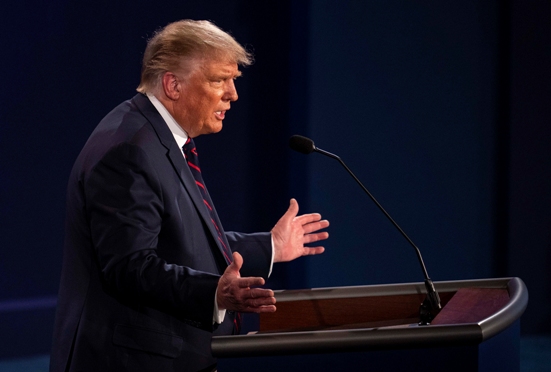For Trump, past is prologue
By Charles M. Blow
If you are having a hard time fathoming how Donald Trump could deny reality, attempt to force-feed America his fictions, fight truth with conspiracy and concoction, and try to spin a loss into a victory, you shouldn’t. You need only be open to a fair analysis of Trump’s life. There is nothing new about this man’s behaviour. This is what he has always been: a liar, a con man and a grifter.
For instance, consider a period in his life 30 years ago, in 1990, and you will see that everything he is doing now he did then. His brazen play at fact alteration isn’t innovation but regurgitation.
New York City was just coming off the racially divisive Central Park Five case in which five young Black and brown teenagers were wrongly convicted of attacking a white female jogger in Central Park. After the attack, Trump took out a full-page newspaper ad calling for New York state to adopt the death penalty and said of the teens in a CNN interview:
“Of course I hate these people. And, let’s all hate these people because maybe hate is what we need if we’re going to get something done.”
In early 1990, Trump and his wife at the time, Ivana, separated and went through a messy divorce based on Ivana’s claim of “cruel and inhumane treatment”.
Author Harry Hurt III wrote in his 1993 book, ‘Lost Tycoon: The Many Lives of Donald J. Trump’, that Ivana asserted during a deposition in the 1990 divorce that Trump had assaulted her.
As The Daily Beast summarized in 2019: “After a painful scalp reduction surgery to remove a bald spot, Donald Trump confronted his then-wife, who had previously used the same plastic surgeon.”
The Daily Beast continued: “Donald held back Ivana’s arms and began to pull out fistfuls of hair from her scalp, as if to mirror the pain he felt from his own operation. He tore off her clothes and unzipped his pants.
“‘Then he jams his penis inside her for the first time in more than sixteen months. Ivana is terrified … It is a violent assault,’ Hurt writes.”
Ivana Trump has strenuously objected to this interpretation of events.
At the same time, Donald Trump’s casino business was floundering.
As The Atlantic reported in 2017:
“In 1990, with Trump Taj Mahal in trouble, Trump’s father Fred strolled in and bought 700 chips worth a total of $3.5 million. The purchase helped the casino pay debt that was due, but because Fred Trump had no plans to gamble, the New Jersey gaming commission ruled that it was a loan that violated operating rules. Trump paid a $30,000 fine; in the end, the loan didn’t prevent a bankruptcy the following year. As noted above, New Jersey also fined Trump $200,000 for arranging to keep Black employees away from Mafioso Robert LiButti’s gambling table.”
And The New York Times reported on Aug 16, 1990, that Trump’s supposed wealth was underwater. According to the Times: “Donald J. Trump’s accountants and bankers have concluded that his empire is worth far less than he contended late last year — and that if he had been forced to sell his assets this spring he might not have realized enough money to get out of debt.”
Still, that August, Trump sits with Barbara Walters for a ‘20/20’ interview for his new book, ‘Trump: Surviving at the Top’. In the interview, Trump begins by attacking the press:
“Whether it’s a marriage, by the way, or whether it’s financial, I’ve never seen press reporting as I have with regard to me. And, I hope the general public understands how inherently dishonest the press in this country is.”
Trump then goes on to try to spin Walters — who would not be spun — on how his teetering on the edge of bankruptcy should actually be seen as success.
In the middle of the interview, Walters put this to Trump: “In your book you say, ‘Success is so often a matter of perception.’ What do you think the perception of you is today?”
Trump responds: “I really don’t know what the perception is. I think people see me as a fighter. I think people have always seen me as a fighter. They know that I don’t take a lot of crap from people, and from others.”
That is what it’s always about for Trump, then as now: perception, not reality. He doesn’t want to be perceived as a loser, even if he is. He doesn’t want to be perceived as a racist, even if he is. He will bend heaven and earth to create an amenable reality when the real reality is counter to his conception of self.
-New York Times


